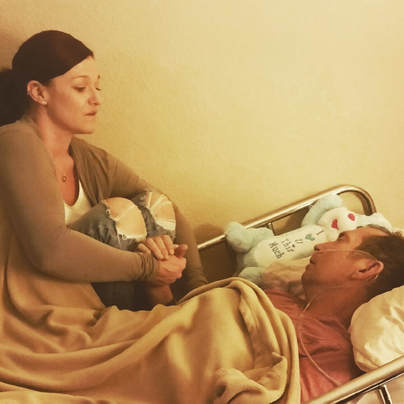"Wait, are you talking about... cancer?" They say that life can change overnight, and it did. Horrifically, terrifyingly, irreparably – it did. In August 2014, we had just gotten back from a two-week vacation with his kids in Hawaii. Patrick surfed, hiked, and was the absolute pinnacle of health. He had been experiencing some strange symptoms over the past few months, including one trip to the emergency room for what was diagnosed as vertigo, and no one even thought to do a CT scan or any follow-up. Just take some anti-nausea medicine, they said. Maybe it's an inner ear thing, they said. We kept on looking for a house and living life as before. Then, on September 15, 2014, at around 2 AM I heard Patrick talking loudly from our living room. I walked out and saw him sitting straight up on the floor. Every word that came out of his mouth was complete jibberish. He was looking at me, but it was like he was looking through me. I can barely get the words out on the page even now, over three years later. I thought he was having a stroke and immediately called 911. When the paramedics arrived, they were asking him questions, and he could not really answer. They pointed at me and asked, “Do you know who she is?” to which he shouted “Yes!” But when they asked him my name, he just stared off into space. He was immediately taken to the hospital, and on the way he had two grand mal seizures. He was put into a medically induced coma for 72 hours, during which time they ran test after test. At the end of four days, they told us that there was some kind of mass in his brain, but that the image was obscured because he had a bleed. Nonetheless, their neurosurgeons had reviewed everything and decided they did not think it was anything unmanageable. They were convinced that he would be able to recover. They were wrong. Patrick had another seizure the next week. This time, the MRI was clear – he had a lesion, which I did not even know meant a tumor. On October 7, 2014, the day before he was scheduled to undergo a craniotomy to remove what they could, the neurosurgeon came in with the results of the new, advanced MRI. He told us that they wouldn't be sure until the pathology came back, but that it looked like a Stage IV astrocytoma, also known as glioblastoma. The surgeon said that once Patrick healed from the surgery, he would need to be fitted for a mask to start radiation, along with oral chemotherapy. "Wait," I gasped. "Are you talking about... cancer?" That is how naive I was. Up until the day before his surgery, I never even considered that we were dealing with cancer. Patrick was going to heal from this. It was going to be a tough recovery, but we would get through this together. We would be able to get married, have babies, buy our house, and come out the other side, stronger than ever. Suddenly, everything stopped. I could barely breathe. I knew absolutely nothing about the illness, but what I did know was that Patrick’s older sister died of the same thing 11 years before. She only made it four months after diagnosis. Patrick went through a gruelingly long surgery and got into the recovery room. The first thing he did when I saw him was crack a joke that his surgeon looked like he was 12. It was so encouraging to see him smile and laugh. He was so tough for everyone all the time. A week later, the pathology was back and our worst fears were confirmed: it was the big monster. A GBM. The one that killed his sister and had a median survival rate of 14 months. I stopped reading the statistics right away when I realized just how bad they were. From then on, I took everything I had learned about being of service to others in my recovery and put it into action. I made it my mission that Patrick would know every day how loved he was. Patrick spent half of his life dedicated to a fellowship and sharing his experience, strength and hope, saving countless lives in the process, and I saw this as my chance to pay that back. I promised him I would never leave him. I never did. I took a leave of absence from my job and committed to being with him throughout the process. This was often incredibly difficult, as Patrick had an extremely complex problem with focal seizures that caused him to suffer from long periods of psychosis. Initially, the facility he treated at didn't know how to handle him and would simply put him in the ICU, heavily sedate him, and tie him up in four-point restraints. I fought like hell with his insurance company and finally got him to UC San Francisco where some of the best and brightest minds in the world did everything they could to help him. Collectively, he spent over five months as an inpatient in the hospital. Often, Patrick was not Patrick. He was mean, angry, and violent. He said things to me that he would have never said to his worst enemy. He accused me of sleeping with everyone who walked in the room, not limited to the men. I knew it was the tumor, but it looked, talked, and sounded like him – it was hard to separate the two. He told me in his lucid moments about how tortured he was during those times. He saw blood dripping from the walls. He thought a nurse's dog was in the ICU was pooping all over the floor and he was furious that no one would stop it. He slowly walked the halls of UCSF, with me and his sitter following behind, shouting "Save yourselves!" to the rest of the neurological unit because he thought all the nurses and doctors were "on the take." He ripped IV's out of his arms and was a semi-frequent "code grey" because he was so combative. The times at home were much the same, often worse, but I did not talk about it for fear that he would be institutionalized - and I was having none of that. I remember one time a friend was visiting when Patrick was no longer ambulatory. I had just gotten him back into bed after washing his bedding, handing him a thermos of chocolate Boost, which was one of the only ways to ensure he got sufficient nutrients. For no apparent reason, he got that look in his eye and he threw the container at me. I watched the brown liquid splatter all over the newly washed sheets, the wall, and me. My friend looked horrified. I gulped and quietly got him back into his wheelchair, stripped the bed, and put the soiled linens back into the washing machine. On another occasion I returned from a short errand while our friend Thom stayed with him, who was one of the only people who could handle him. I walked in, greeted by that look, and he started calling me a vulgar name repeatedly. I thanked Thom for his help and said he could go, tears streaming down my cheeks. Usually, Patrick would have these episodes and he would go to sleep with no memory of it when he woke. This time, he did not even go to sleep, and about ten minutes later touched my arm tenderly saying, "Baby, what's wrong?" I did not always keep my cool, and I said "Do you not remember what you just said in front of Thom?" He didn't, and insisted I tell him. I did. He began to cry uncontrollably, rocking back and forth saying "How does that happen?!" over and over. I have never seen him look more devastated. When I realized he had absolutely no recollection of what had happened only moments earlier, I held him and we sobbed together. I am not telling you this because I want you to feel bad for me, or to think Patrick was a bad guy. I hope by now you know that Patrick was an AMAZING man. I am talking about this because it was the truth of our experience. The tumor had a life of its own. I lived for the moments when he was my sweetie, and he always came back from those dark moments. In spite of those extreme challenges, we also experienced moments of true joy. Patrick asked me to marry him when he was in the hospital. At the beginning of May in 2015, he made the courageous decision to go into hospice care, because he did not want to be in the hospital or feel like a science experiment anymore. We planned our wedding in a week. I bought my dress online and picked up his digs at the mall. Thank goodness he had taught me how to dress him, because he was VERY particular about fashion. My friends got the flowers. Our invitation was a group text message. On May 24, 2015 we were married on a bridge over a pond at our apartment complex. My brother-in-law performed the ceremony with our closest family and friends present. He had a really good day that day, and so did I. It was perfect. Unfortunately, brain cancer has no regard for the newly married, or any of one’s plans. The day after Patrick's 55th birthday, he went in to his last eight days of decline. I gave him morphine around the clock to keep him comfortable. I opened our doors to loved ones who needed their final moments with him. His family was present as he was read his last rites. In the end, I was holding his hand when I tearfully said “Baby, I love you. I’m going to be okay. You can go now.” And he did. At 4:26 AM on July 11, 2015, just 48 days after we said “I do,” Patrick died in my arms.
4 Comments
Peter Meuleners
1/25/2018 05:39:09 pm
Patrick loved you as much as I have ever seen one human love another.
Reply
Gino
1/31/2018 09:13:56 am
I loved both of you then and I always will.
Reply
Lisa
2/13/2018 09:28:19 am
You have brought me to tears. As I read your story, so much of it reminds me of my own. Living through the nightmare of my husbands cancer, now living in this even worse nightmare without him. Like you, nothing about my life looks like I had hoped. I'm 46 and so afraid of what the future holds for me. I don't consider myself a strong person but I have had no choice but to do the best I can, keep going and surviving.
Reply
Kim smith
4/4/2020 11:57:58 am
So heartbreakingly sad, but so realistic . My lifelong love has leukeimia, and has been treated for it the past 3 years, This is so chronic that it is so draining for him and me. We conform to our situation) the situation does NOT conform to our lives,,,,,,,,I think it took me awhile to understand, and come to terms with this,,,,,,,,,,,,,,
Reply
Your comment will be posted after it is approved.
Leave a Reply. |
Details
AuthorLisa O'Leary is a lawyer, cat mom, widow, sports enthusiast, advocate for the unheard, truth seeker, soul searcher, meditator, and consciousness practitioner who is actively engaged in quieting down the mind to allow the song to play. Her years living with chronic pain and illness, as well as her mental health challenges, make her a formidable opponent to anyone or anything who seek to destroy her pursuit of truth and light. Archives
December 2023
Categories |

 RSS Feed
RSS Feed